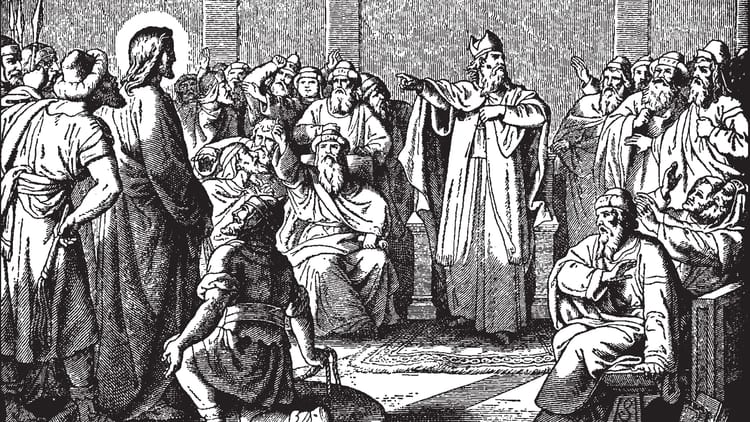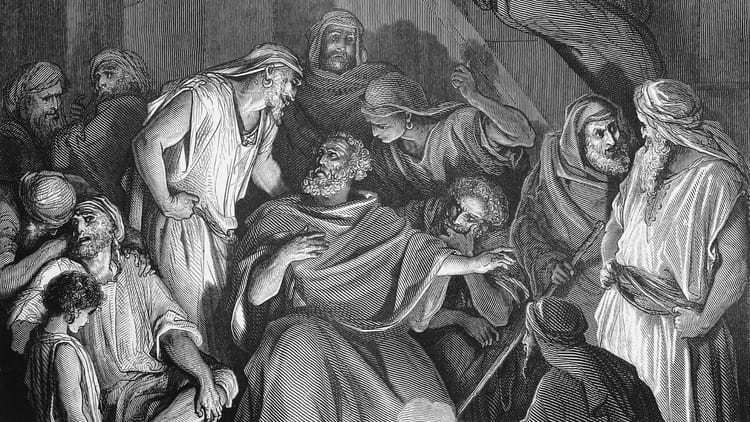The Kingdom’s Upside-Down Values (Mark 10:1-31)

Sometimes we like to think that Jesus is a nice addition to our lives; that he comes and makes things a little bit better. We think that he came to make good people even better.
Today we’re going to see that nothing can be further from the truth. Today Jesus is going to go into three areas of our lives and turn things completely upside down. Even worse, these are three critical areas. You don’t get more personal than marriage, our view of people, and money. Today's passage shows how Jesus completely changes our perspective and introduces something entirely new, beyond what we could imagine.
So let’s look at this passage as simply as we can this morning, and look at three things: our world’s story, the kingdom story, and how we can make the switch.
First: Let’s look at the world’s story.
This week I was standing on a subway platform watching the news on the monitors. I saw that a homicide had taken place in Newmarket at the GO station that I used to use way back when I was dating Charlene. I thought about it for a second and then moved on before catching myself. Why was I able to read about something as brutal as the homicide of a person and then just go on with my business? We are so used to the old story that we don’t know any different. We think it’s normal, the way it’s supposed to be.
You and I are not surprised by the brokenness of the world. When we get the newspaper, we aren’t surprised to read about crime and corruption and negative politics. When we get a credit card, we aren’t surprised that we have to sign the back or learn the PIN number. We anticipate theft. When you go to a store, you don’t expect that you can cash yourself out and make change from the cash drawer. You know that would never work. We recognize that we live in a broken world. We have grown used to it, and we even think it’s normal.
In the passage before us, Jesus identifies this pattern in three areas of our lives:
Marriage – Notice the question in verse 2: “Is it lawful for a man to divorce his wife?” The question wasn't innocent. Verse 1 tells us that Jesus is back in Judea, in Herod’s territory. Herod killed John the Baptist because he questioned his divorce and marriage to his brother's sister. So they’re not really interested in Jesus’ answer as much as they are in trapping him. Verse 2 even tells us that they asked this question in order to trap Jesus.
Jesus asks about marriage in the Bible, and they mention Deuteronomy 24, where Moses established rules for divorce with strict guidelines. You’ll notice that Jesus asks what Moses commanded, while they respond with what Moses permitted. When the Pharisees asked Jesus, it was commonly believed that a man could divorce his wife for almost any reason. The historian Josephus divorced his second wife because he was “displeased with her behavior.” One rabbi allowed a husband to divorce his wife if she spoiled a meal, or merely “if he found another fairer than she.” They took divorce for granted as something that is almost inevitable.
We are similar. We’re saddened by marriage breakups, but we’re not shocked. We’ve come to accept brokenness in the most intimate of relationships as almost being normal.
What happened is they took a concession to human sinfulness and made it the norm. It’s a little like trying to learn how to fly by following the rules for a crash landing. You don’t get in an airplane expecting it’s going to crash. But divorce was so common that people then – and today – almost expect it to happen.
People – Then there’s people. It’s easy to miss the brokenness in verses 13 to 16 because our culture is so different. It’s easy to miss what it’s getting at. In Jesus’ day, children were not highly valued. Childhood was seen as an unavoidable interim period between birth and adulthood. Children really didn’t contribute much to a family. They consumed lots of resources but gave very little in return. Six out of ten children died before the age of 16. Children were seen as the least important members of society.
So when people brought their little children to Jesus in verse 13, you understand why the disciples rebuked them. These children were inconveniences. They were people of very little value.
If we’re honest, we’ll admit that there are people who don’t matter much. They really don’t rank. We look down on them and push them away because we have no time for them. We often rank people based on how important we think they are and treat them accordingly.
Last year we ran a workshop here at the church. I was running around at the last minute trying to get everything done. We were encouraging people to come through the front doors. I was running through my office when somebody rang the buzzer. I don’t know why people are so stupid, I thought. So I answered the buzzer and was a little bit short. I asked them to go to the front doors and I’m sure I said with my attitude that they shouldn’t bother me anymore. About thirty seconds later I realized that these were not conference attendees. They were the conference leaders. I treated them like dirt because I assigned them to a class of people I really didn’t have time for at the moment.
In this passage we come to realize that we do the same thing. We tend to write off people who are less important. We walk in a room and size up the important people, and those we’d rather avoid. This is part of the world’s story, and we’ve become used to it.
Money and Success – The last area Jesus deals with could be the hardest. A man comes to Jesus who has a lot going for him. People would have assumed that God had blessed him, because he’s rich and moral. As he talks to Jesus, he demonstrates that he has a good understanding of Scripture. What’s more, he’s moral. Mark 10:21 says, “Jesus looked at him and loved him.” Even Jesus loved him.
This man embodies success. He is everything that we long to be. He’s successful; he’s wealthy; he’s a good man. He knows the Scriptures. Even Jesus loves him. We would be proud to have this man as a member in our church. Jesus could benefit from having such a person as a disciple. It never hurts to have someone with some cash, especially when he’s well respected and likable. But Jesus does the unthinkable and asks him to liquidate his entire net worth and give it all away. The man, saddened, leaves. I can imagine the disciples stunned as they watched the man walk away.
What we see in this passage is a complete rejection of the world’s story by Jesus. Jesus identifies three things we know to be true in this world and completely rejects them:
- We know that relationships fracture and blow apart, even marriages.
- We know that we can’t treat everyone equally, and that some people are less important and can’t offer us as much as others.
- We understand that the goal is to become a good and successful person.
Jesus looks at all of this and rejects all of it. What he’s telling us is that life is very different in his kingdom. He’s leading a revolution that turns everything upside down.
What’s the alternative? What’s the kingdom story?
In July 1999, John F. Kennedy Jr. died in a plane crash in the Atlantic Ocean off of Martha’s Vineyard. The probable cause was pilot error, spatial disorientation. One pilot explained the disorientation that can happen when you fly by sight only without the proper training:
The airplane’s flight path creates forces that befuddle one’s awareness of earth’s gravity. To judge by the sensations in the seat of your pants, you literally can’t tell up from down, left from right. You are as helpless to move out of the airplane’s acceleration field as you would be if you were pinned to the side of a spinning circus centrifuge when the floor drops away.
And here is the crux of the matter: the pilot’s emotions drowned out the flight instruments’ story about banking and diving at high speed, and screamed out, No way! It can’t be! I’m actually flying straight and level! I know it! I feel it’s true!…
Following your heart will kill you, as it killed young Kennedy, and thousands of other pilots over the years who have failed to recover from a graveyard spiral.
What Jesus tells us in this passage is that we’re flying completely disoriented, and it’s going to kill us. And he pulls us from the world’s story to the kingdom story in these three areas:
Marriage – Jesus essentially says we’re asking the wrong question. Instead of asking when we can divorce, Jesus says we should be asking what God’s original design was for marriage. Jesus says:
“It was because your hearts were hard that Moses wrote you this law,” Jesus replied. “But at the beginning of creation God ‘made them male and female.’ ‘For this reason a man will leave his father and mother and be united to his wife, and the two will become one flesh.’ So they are no longer two, but one. Therefore what God has joined together, let no one separate.” (Mark 10:6-9)
What’s he saying? He’s saying that in the kingdom, the question isn’t when divorce is permissible. The kingdom question is how we can live into the story of God’s design for marriage. You see the original intention here of:
- lifelong commitment
- intimacy – that the whole lives are intertwined as one flesh
- permanence
In his kingdom, Jesus says, the question is not when we’re allowed to divorce, but how we can live into this story instead of the world’s story. In a group this big there are going to be some who have experienced failure in this area of life. You know how horrible divorce is. Jesus and others in Scripture deal with questions of how to handle this. As we’re going to see in a moment, there’s hope for even those of us who have failed. But in the kingdom story, failure won’t be assumed, because we will be looking for ways to live out the kingdom story in our marriages.
People – Jesus says: “Let the little children come to me, and do not hinder them, for the kingdom of God belongs to such as these” (Mark 10:14). In the kingdom, the people who matter least matter a lot to Jesus. The kingdom means welcoming and embracing people who can do nothing for you in return, people that nobody else has time for. In the kingdom’s story, the people everyone else avoids are not only welcomed but embraced. Jesus has time to receive them and to bless them. The least powerful, the least wealthy, the least influential have a greater prospect of entering the kingdom than those who are powerful, wealthy, and influential.
Money and Success – In the kingdom, the world’s view of success is turned upside down. We look at the rich, moral, successful, and well-liked and admire those qualities, even aspiring to have them for ourselves. But in the kingdom, the very thing the world values can become impediments to participating in the kingdom story. Jesus says, “Children, how hard it is to enter the kingdom of God! It is easier for a camel to go through the eye of a needle than for the rich to enter the kingdom of God” (Mark 10:24-25). This is sobering, because the poorest among us have a lifestyle that the rich in Jesus’ day couldn’t have imagined. Our riches and our success get in the way of living the kingdom story. This man had kept many of the commandments, but he had broken the first commandment, the one that is the foundation for the rest. He may have been moral, but he had gods before the one true God. Haddon Robinson says:
For every verse in the Bible that tells us the benefits of wealth, there are ten that tell us the danger of wealth, for money has a way of binding us to what is physical and temporal, and blinding us to what is spiritual and eternal. It’s a bit like the fly and the flypaper. The fly lands on the flypaper and says, “My flypaper.” When the flypaper says, “My fly,” the fly is dead. It is one thing to have money, another for money to have you. When it does, it will kill you.
As somebody said years ago, it’s difficult for a person to have riches and not to love them. It’s difficult for a person to have riches, and not be proud because of them. It’s difficult for a person to have riches, and not be corrupted by them. And it’s difficult for a person to have riches and not trust in them. “To place our confidence in anything but God is certain ruin” (Charles Simeon).
Jesus gets to the heart of all this when he says, “But many who are first will be last, and the last first.” In other words, the kingdom story is completely upside down from the world’s story. If you’re flying according to the world’s story, you’re flying like John F. Kennedy Jr. “Following your heart will kill you, as it killed young Kennedy, and thousands of other pilots over the years who have failed to recover from a graveyard spiral.”
So how can we make the transition from the world’s story to the kingdom story?
Really, one of the keys to this passage is seeing the contrast between two of the characters. The rich man has everything. He’s moral. He’s rich. He’s successful. But he walks away living according to the world’s story. “At this the man’s face fell. He went away sad, because he had great wealth” (Mark 10:22).
But there’s another set of characters in this passage who show us how we can enter the kingdom story. In Mark 10:14-16 Jesus says:
Let the little children come to me, and do not hinder them, for the kingdom of God belongs to such as these. Truly I tell you, anyone who will not receive the kingdom of God like a little child will never enter it.” And he took the children in his arms, placed his hands on them and blessed them.
We have to become like a little child in order to enter the kingdom, Jesus says. What did he mean by this? That we have to become innocent like children, spontaneous, or humble? I believe what Jesus identifies is none of these qualities, but the essential quality necessary for entering the kingdom: helplessness. As one commentator puts it:
In this story children are not blessed for their virtues but for what they lack: they come only as they are – small, powerless, without sophistication, as the overlooked and dispossessed of society. To receive the kingdom of God as a child is to receive it as one who has no credits, no clout, no claims. A little child has nothing to bring, and whatever a child receives, he or she receives by grace on the basis of sheer neediness rather than by any merit inherent in him – or herself. Little children are paradigmatic disciples, for only empty hands can be filled. (J.R. Edwards, The Gospel According to Mark)
We are flying upside down. We’re spatially disoriented because the kingdom’s story seems upside down.
This morning you’re invited to become a little child and come to Jesus, the one who obtained an upside-down victory – triumphing through the cross – so that we could live.
Father, we are so used to living according to the world’s story that we don’t even see the alternative. Thank you for showing us this morning that there’s a different way, and that it touches the most intimate areas of our lives: marriage, how we see people, and even our ideas of success.
Thank you for showing us that we can come as children, empty-handed – no credit, no clout, no claims. And thank you that we can receive all the riches of Christ by sheer grace and through no merit of our own. So we come. May you turn us right-side up, so we can grasp what Christ has done for us, and live according to the kingdom’s values. We pray in Jesus’ name, Amen.





